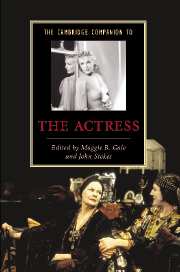Book contents
- Frontmatter
- Introduction
- Part I Turning points
- Part II Professional opportunities
- Part III Genre, form and tradition
- 12 Mirroring men: the actress in drag
- 13 ‘Studies in hysteria’: actress and courtesan, Sarah Bernhardt and Mrs Patrick Campbell
- 14 Beyond the muse: the Spanish actress as collaborator
- 15 Going solo: an historical perspective on the actress and the monologue
- 16 Changing Shakespeare: new possibilities for the modern actress
- General reading
- Index
16 - Changing Shakespeare: new possibilities for the modern actress
from Part III - Genre, form and tradition
Published online by Cambridge University Press: 28 November 2008
- Frontmatter
- Introduction
- Part I Turning points
- Part II Professional opportunities
- Part III Genre, form and tradition
- 12 Mirroring men: the actress in drag
- 13 ‘Studies in hysteria’: actress and courtesan, Sarah Bernhardt and Mrs Patrick Campbell
- 14 Beyond the muse: the Spanish actress as collaborator
- 15 Going solo: an historical perspective on the actress and the monologue
- 16 Changing Shakespeare: new possibilities for the modern actress
- General reading
- Index
Summary
In the 1980s and 1990s there was plenty of evidence, in interviews with and articles by Shakespearean actresses, that the perspectives of second-wave feminism had influenced their thinking about the characters and stories of Shakespeare's plays. The question arises, however, as to what difference, if any, this new awareness has made to what the twenty-first-century audience sees. Little in the record of Britain's Royal Shakespeare Company in recent years indicates any change in the relation between women performers and the Shakespeare industry. The few plays directed by women have been disliked or ignored by critics and other opinion-makers. As for the new generation of actresses, the older stars were still the dominant attraction. Judi Dench, for example, played the Countess in All's Well That Ends Well in 2004, to rave reviews that had a strong undertone of nostalgia and valediction: here was an actress who had blazed her way through an astonishing range of Shakespearean roles for nearly forty years (not to mention modern drama, film and television comedy), possibly playing her last major stage role. One critic's comments sum up Dench's unique contribution to Shakespearean acting in the second half of the twentieth century: “What Judi Dench does as the Countess in All's Well That Ends Well goes way beyond acting. She combines humility with authority, she makes the world on the stage larger by the quality of her attention to others, she conceives her role in a large arc that takes her audience a mighty distance, and she plays it with an economy through which tiny movements and inflections pierce straight to the heart.”
- Type
- Chapter
- Information
- The Cambridge Companion to the Actress , pp. 314 - 326Publisher: Cambridge University PressPrint publication year: 2007

